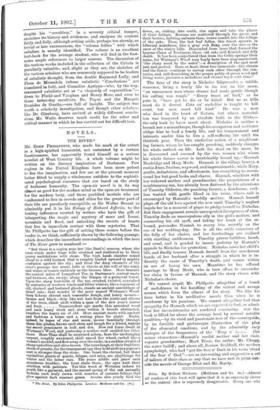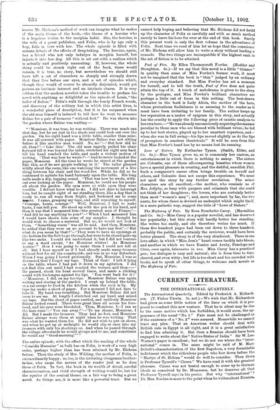Felix. By Robert Hichens. (Methuen and Co. 6s.)—Almost all readers
of this book will agree that it is as supremely clever as the central idea is supremely disagreeable. Every one who
knows Mr. Hichons's method of work can imagine what he makes of the main theme of the book,—the theme of a heroine who is a hopeless victim to the morphia habit. She, the heroine, is the wife of a great publisher, and Felix, who is by age only a boy, falls in love with her. The whole episode is filled with minute details of the effects of drug-taking. The heroine, again, has a friend who not only indulges in morphia herself, but injects it into her dog. All this is set out with a realism which is actually and positively nauseating. If, however, the whole thing could be struck right out of the book, there would remain, it is true, no story, but nevertheless we should still have left a sot of characters so sharply and strongly drawn that they live before our eyes, and a set of episodes which, though they would of course be absurdly disjointed, would yet possess an intrinsic interest and an intrinsic charm. It is very seldom that the modern novelist takes the trouble to preface his novel with anything so delightful as the episode of Louis, "the tailor of Balzac." Felix's walk through the lonely French woods, and discovery of the solitary hut in which this artist lives, is a wonderful piece of description, but it is far surpassed when the old man himself is induced to tell how he went to measure Balzac for a pair of trousers "without feet." He was shown into the garden where Balzac was waiting :— " 'Monsieur, it was true, he was writing. There was much sun that day, but he sat just in the shade and could look out over the garden. On his right hand was a little table, smaller than mine. It was all oovered with paper. Monsieur Balzac was not sitting
before it like another man would. No, no ! But how did he sit, then ?'—' Like this.' The old man eagerly pulled his chair forward till it was beyond the table, stretched his right arm back till his hand reached the table, and made a violent motion of writing. That was how he wrote ?'—' And he never looked at the paper, Monsieur. All the time he wrote he stared at the garden like this, as if he saw people walking in it.' The tailor glanced wildly about the room, like one watching the movement of a live thing between his chair and the wood fire. While he did so he continued to agitate his hand furiously upon the table. His long nails made a dry, tapping sound. 'That was how he wrote, with- out ever looking at the paper. Monsieur, he could see his people all about the garden. His eyes were so wide open they were terrible. I did not know what to do. I did not dare to interrupt him, but he caught sight of me standing there, like a dog that is ready to run all ways from fright, and beckoned me to come nearer. I came, grasping my tape, and still repeating to myself, "Courage. Louis, courage ! " Well, Monsieur, I had to make haste, I can tell you. He stood up with the pen in his hand, and then it was that I measured him—the greatest man of France!— ' And did he say anything to you ?'—' When I had measured him I would have shown him some of my samples. I thought he would wish to choose a material. But no, he would not look at them. "Something warm" was all he said. And then, Monsieur, he added that they were on no account to have any feet.'—' But what do you mean by that ?'—' They were to have no openings at the bottom for the feet to go through, but were to be closed quite up like two sacks. I could not understand it, but I did not venture to say a word except, "As Monsieur wishes ! As Monsieur desires !" How I was going to make them I could not tell at all. But I bore myself as if I had already made many trousers without feet for all the countryside, and was in no way disturbed. When I was going I bowed profoundly. But, Monsieur, I was so distracted that I forgot my tape. Think of that! I left it lying on the table, where I had put it down in my agitation. I did
not find this out until I had reached the terrace, and then ' He paused, shook his head several times, and made a clickblg sound with his tongue against his lips. You went back for it ?' = Monsieur, I did, on my toe-tips. Monsieur Balzac was again writing and staring at the garden. I crept up behind the table, se a rat creeps to food in the kitchen when the cook is by. My tape lay under a sheet of paper. For a moment I did not dare to take it. My hand was trembling. But Monsieur Balzac did not seem to see me. At length I stretched out my hand and seized my tape. But the sheet of paper rustled, and suddenly Monsieur Balzac looked round. There were great lines all across his fore- head, and his eyes were bloodshot. Then, Monsieur, I—I ran as the hare runs.'—' You ran away ? To my shame, Monsieur, I lid. But I made the trousers. They had no feet, and Monsieur Balzac always wore them at night when he was writing. That was what he wanted them for. He did not wish to put on shoes, s.nd when he got up at midnight he would slip at once into my trousers with only his stockings on. And when he passed through the village afterwards he would always nod to me, and sometimes he would say " Good-morning." "
The entire episode, with the effect which the reading of the whole " Combdie liumaine" in bulk has on Felix, is work of a very high order, perhaps higher than has been attained by Mr. lichens before. Then the study of Mrs. Wilding, the mother of Felix, is extraordinarily happy; so, too, is the imitating clergyman brother- in-law, who rasps the nerves of the reader just as he does those of Felix. In fact, the book in its wealth of detail, careful characterisation, and vivid strength of writing would be, but for the squalor of the central theme, on a fair way to being a great novel. As things are, it is more like a powerful tract. But we
cannot help hoping and believing that Mr. Richens did not build up the character of Felix so carefully and with so much method merely to leave his hero for ever at the end of this book. Surely this present work is only the first volume in the adventures of Felix. Next time we read of him let us hope that the conscience of Mr. lichens will allow him to write a story without leading a crusade. The two things are incompatible if the highest rank in the art of fiction is to be attained.











































 Previous page
Previous page